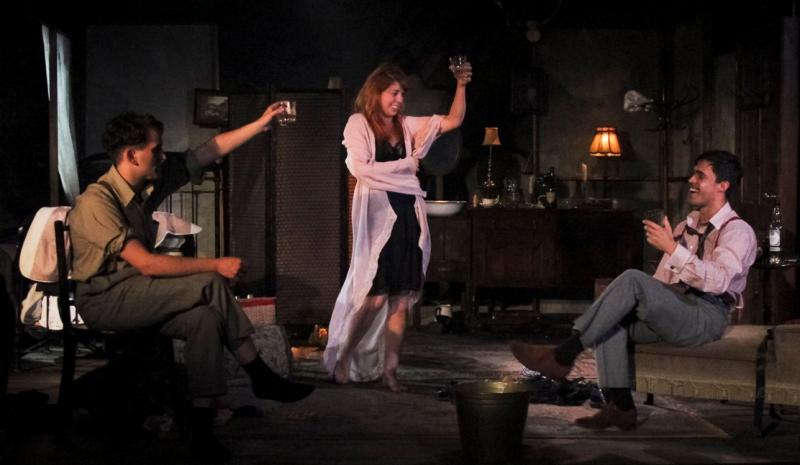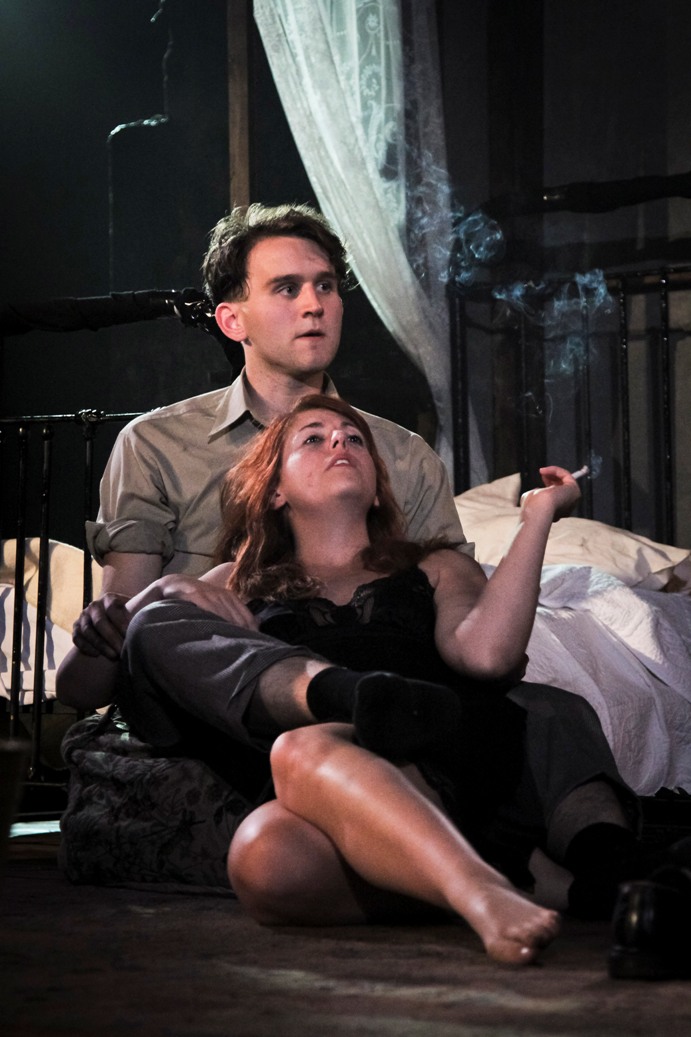I Am a Camera, Southwark Playhouse | reviews, news & interviews
I Am a Camera, Southwark Playhouse
I Am a Camera, Southwark Playhouse
A zesty, sensuous production based on Christopher Isherwood's memoirs

The Kander and Ebb musical Cabaret, inspired by the Berlin stories of Christopher Isherwood, is soon to return to the West End with Will Young. Its less well-known source is John Van Druten's 1952 play I Am a Camera.
The play focuses on Christopher's relationships with the people he meets in the city: Sally Bowles, an actress from Lancashire – said to be based on nightclub singer Jean Ross; his landlady, the maternal Fraulein Schneider; Fritz, a slick ladies' man; Natalia, his wealthy Jewish student; and Clive, a phoney American. Unlike in the musical, there is no seedy Kit Kat Club and no hit songs. Instead, there is quippy dialogue, swift changes in mood and an intimate setting.
The stone floors and brick walls suggest Berlin's club scene of the Thirties
Anthony Lau's zesty production captures the tension between a young Isherwood sensing trouble and society's inability – or refusal – to pick up on the imminent danger. Christopher's predominant concern is with himself – a young writer, he wants material for his next book – but he is neither oblivious nor unsympathetic to his surroundings.
It is the amped-up characters, alongside Christopher's gradual realisation of the values and limitations of being an observer, that make I Am a Camera so captivating. And it is the strong cast and swift direction that makes this production a joy to watch. James Turner's cosily lit set of Sally's shabby, but sensuous room, with its velvet chaise lounge and faded carpets, serves as the focus for constant comings and goings.
 Harry Melling as Christopher gleams with neurotic anxiety, while Rebecca Humphries (pictured right with Melling) plays Sally Bowles with scene-stealing radiance: she is carefree and excitable. Their friendship, they proclaim, is “eternal”, although the ending of the play suggests otherwise. Isherwood's homosexuality goes unmentioned, but Sally continually brings back unsuitable men to their rooms, including flashy Clive, played with swagger by the dashing Oliver Rix. Clive lavishes Sally with champagne, while many Germans struggle to buy food.
Harry Melling as Christopher gleams with neurotic anxiety, while Rebecca Humphries (pictured right with Melling) plays Sally Bowles with scene-stealing radiance: she is carefree and excitable. Their friendship, they proclaim, is “eternal”, although the ending of the play suggests otherwise. Isherwood's homosexuality goes unmentioned, but Sally continually brings back unsuitable men to their rooms, including flashy Clive, played with swagger by the dashing Oliver Rix. Clive lavishes Sally with champagne, while many Germans struggle to buy food.
Meanwhile, Natalia, played by Sophie Dickson with a Chekhovian sense of dry wit and high tragedy, and Fritz, a friend of Christopher's, fall in love. When Fraulein Schneider begins to blame Jews for the country's problems and Natalia faces anti-Semitic threats, Christopher can no longer stay on the side of the camera's viewfinder. Generous and compassionate, he stands up to his landlady and defends Natalia.
The swirling darkness of the Vault, beneath a platform of London Bridge station, makes the ideal auditorium for this play. The stone floors and brick walls suggest Berlin's club scene of the Thirties, with musicians playing a clarinet, double bass and piano playing on stage through scene changes. But the main advantage is inadvertent. The rumble of trains overhead ominously suggest the bombs of war in years to come: the environment points to the future in a way that even Isherwood couldn't have foreseen.
- I Am A Camera at Southwark Playhouse until 22 September
Add comment
The future of Arts Journalism
You can stop theartsdesk.com closing!
We urgently need financing to survive. Our fundraising drive has thus far raised £49,000 but we need to reach £100,000 or we will be forced to close. Please contribute here: https://gofund.me/c3f6033d
And if you can forward this information to anyone who might assist, we’d be grateful.

Subscribe to theartsdesk.com
Thank you for continuing to read our work on theartsdesk.com. For unlimited access to every article in its entirety, including our archive of more than 15,000 pieces, we're asking for £5 per month or £40 per year. We feel it's a very good deal, and hope you do too.
To take a subscription now simply click here.
And if you're looking for that extra gift for a friend or family member, why not treat them to a theartsdesk.com gift subscription?
more Theatre
 Get Down Tonight, Charing Cross Theatre review - glitz and hits from the 70s
If you love the songs of KC and the Sunshine Band, Please Do Go!
Get Down Tonight, Charing Cross Theatre review - glitz and hits from the 70s
If you love the songs of KC and the Sunshine Band, Please Do Go!
 Punch, Apollo Theatre review - powerful play about the strength of redemption
James Graham's play transfixes the audience at every stage
Punch, Apollo Theatre review - powerful play about the strength of redemption
James Graham's play transfixes the audience at every stage
 The Billionaire Inside Your Head, Hampstead Theatre review - a map of a man with OCD
Will Lord's promising debut burdens a fine cast with too much dialogue
The Billionaire Inside Your Head, Hampstead Theatre review - a map of a man with OCD
Will Lord's promising debut burdens a fine cast with too much dialogue
 50 First Dates: The Musical, The Other Palace review - romcom turned musical
Date movie about repeating dates inspires date musical
50 First Dates: The Musical, The Other Palace review - romcom turned musical
Date movie about repeating dates inspires date musical
 Bacchae, National Theatre review - cheeky, uneven version of Euripides' tragedy
Indhu Rubasingham's tenure gets off to a bold, comic start
Bacchae, National Theatre review - cheeky, uneven version of Euripides' tragedy
Indhu Rubasingham's tenure gets off to a bold, comic start
 The Harder They Come, Stratford East review - still packs a punch, half a century on
Natey Jones and Madeline Charlemagne lead a perfectly realised adaptation of the seminal movie
The Harder They Come, Stratford East review - still packs a punch, half a century on
Natey Jones and Madeline Charlemagne lead a perfectly realised adaptation of the seminal movie
 The Weir, Harold Pinter Theatre review - evasive fantasy, bleak truth and possible community
Three outstanding performances in Conor McPherson’s atmospheric five-hander
The Weir, Harold Pinter Theatre review - evasive fantasy, bleak truth and possible community
Three outstanding performances in Conor McPherson’s atmospheric five-hander
 Dracula, Lyric Hammersmith review - hit-and-miss recasting of the familiar story as feminist diatribe
Morgan Lloyd Malcolm's version puts Mina Harkness centre-stage
Dracula, Lyric Hammersmith review - hit-and-miss recasting of the familiar story as feminist diatribe
Morgan Lloyd Malcolm's version puts Mina Harkness centre-stage
 The Code, Southwark Playhouse Elephant review - superbly cast, resonant play about the price of fame in Hollywood
Tracie Bennett is outstanding as a ribald, riotous Tallulah Bankhead
The Code, Southwark Playhouse Elephant review - superbly cast, resonant play about the price of fame in Hollywood
Tracie Bennett is outstanding as a ribald, riotous Tallulah Bankhead
 Reunion, Kiln Theatre review - a stormy night in every sense
Beautifully acted, but desperately grim drama
Reunion, Kiln Theatre review - a stormy night in every sense
Beautifully acted, but desperately grim drama

Comments
Atmosphere and location